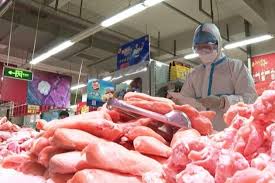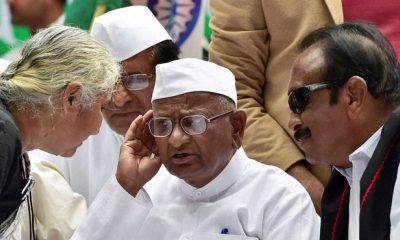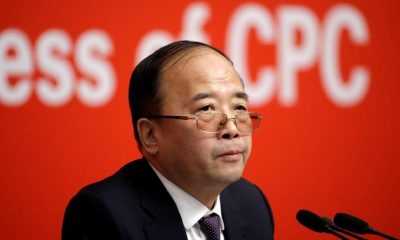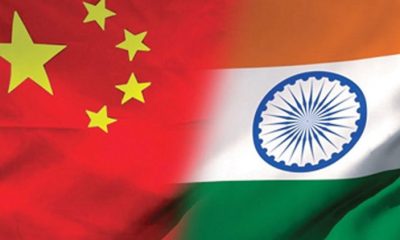World
China’s year of fighting corruption

Beijing: The fact that “anti-corruption” was chosen as the Chinese word of the year in 2014 underlines the success of its blitzkrieg against graft.
The very fact that Zhou Yongkang, once one of the most powerful officials in China, was handed over to prosecutors in early December shows the seriousness of the crusade that was launched after Xi Jingping became president in 2012.
Zhou, one of nine Standing Committee members of the Political Bureau of the Communist Party of China (CPC) Central Committee from 2007 to 2012, was the highest-ranking official taken down in this year’s anti-corruption campaign.
“Nailing a high-ranking official like Zhou sends a strong message to all senior officials. It supports the Party’s zero-tolerance policy against corruption,” state-run news agency quoted Huang Weiting, a researcher with Seeking Truth, the official magazine of the CPC Central Committee, as saying.
Nobody has been spared in this fight, whether they be “tigers”, a popular term for high-ranking corrupt officials, or “flies”, the term for low-ranking corrupt officials.
The fight is not just about deterrence only. It is a protracted war given the scale of investigations as well as new initiatives and legal reform, according to reports.
“Although the majority of CPC members are dutiful and well behaved, corruption has been a prevailing problem and will be a serious threat to the party’s rule of the country if not well contained,” Huang said.
Citing the CPC Central Commission for Discipline Inspection (CCDI), Xinhua reported that about 50 officials at the provincial and ministerial level or higher have been investigated for corruption or other serious disciplinary violations since November 2012.
The fight against corruption has not been confined to within the borders of China alone. Operation Fox Hunt, launched as part of the campaign, is aimed at tracking down corrupt Chinese officials and businessmen who have fled abroad.
According to data released by the Washington-based Global Financial Integrity Group, around $1.1 trillion flowed out illegally from China between 2002 and 2011, most of it through casinos in Macau.
Operation Fox Hunt, which will end Dec 31, has brought about 400 fugitives back to China, many of whom were corrupt officials, and 54 percent of them have turned themselves in, according to Xinhua.
Ren Jianming, an expert on anti-corruption and governance with the Beijing University of Aeronautics and Astronautics, told Xinhua that these new initiatives have helped close loopholes in the party and government systems and contributed to the long-term anti-graft battle.
The fight against corruption apart, 2014 also saw China getting involved in diplomatic tangles vis-a-vis its territorial rights over the South China Sea.
According to a position paper released by the Chinese foreign ministry in December on the matter of jurisdiction in the South China Sea arbitration initiated by the Philippines, the Chinese government will neither accept nor participate in arbitration in the International Court of Justice.
In March, China said that it would not allow the Philippines to occupy the Ren’ai Reef off China’s Nansha Islands in any form, while reiterating that China owned sovereignty over the islands.
In June, China urged Vietnam to stop all disruptions to drilling near the Xisha Islands in the South China Sea, and withdraw all vessels from the scene.
In July, China urged “countries outside the region” to stay out of disputes over the South China Sea after a US official proposed that claimants freeze actions which could change the status-quo in the region, according to the position paper.
The year 2014 also saw turbulence in China’s ties with Japan.
It all started with Japanese Prime Minister Shinzo Abe and his cabinet ministers visiting the controversial Yasukuni war memorial.
“The Yasukuni Shrine honours 14 convicted Class-A Japanese war criminals from World War II and glorifies its history of aggression,” Chinese foreign ministry spokeswoman Hua Chunying said Aug 16.
“The visit and offering again reflect the Japanese government’s wrong attitude toward historical issues,” she stated.
The Diaoyu islands also continued to remain a bone of contention between China and Japan.
On Aug 1, China opposed Japan’s naming of five islets belonging to the Diaoyu Islands, saying the move was illegal and invalid.
Japan’s resolution to allow the country to exercise its right of collective self-defence by reinterpreting the pacifist constitution and thus paving the way for Japanese forces to fight abroad also riled China.
However, China’s relations with India received a fillip when President Xi Jinping visited India in September at the invitation of new Indian Prime Minister Narendra Modi.
Though India’s concerns over Chinese troops’ incursions remained at the forefront of talks between Modi and Xi, the two nations charted a new chapter in economic ties with Beijing announcing $20 billion investment over the next five years.
On the border issue, Xi said both sides have agreed to “continue to be sensitive and respectful to each other’s sensitivities and concerns and progressively handle the outstanding issues in a positive attitude”.
National
Foodman Vishal Singh Honored for Hunger Free World Mission in Bangkok

Lucknow: Vishal Singh, a renowned social worker from Lucknow, also known as Foodman, has once again made India proud. He was honored by the Happy Hands Gloves Cooperative Limited Company in Korathai, Thailand, for his work with the Hunger Free World Mission.
The Hunger Free World Mission’s meeting was held in Korathai, Thailand, under Vishal Singh’s leadership. Representatives from several countries, including Mr. Raja Dwivedi (Managing Director of Happy Hands Gloves Limited), Thailand Coordinator Mr. Raja Mishra, and member Mr. Varun Singh, attended the event.

Under Vishal Singh’s leadership, the attendees took a pledge to work together toward creating a hunger-free world.
Speaking on the occasion, Vishal Singh explained that the main goal of the Hunger Free World Mission is social participation. He said the mission is not just about feeding people but also about meeting other basic needs of those who are struggling. The mission focuses on helping families of terminally ill patients in hospitals by providing food and shelter. It also works to fulfill essential needs like education, jobs, and care for the elderly.
For the last 16 years, the Vijay Sri Foundation has been providing free services, benefiting thousands of people. Vishal Singh highlighted that the mission aims to gain global recognition like other organizations such as WHO, WWF, and Red Cross, which work for social causes.
During this meeting, Vishal Singh was appointed as the Chairman of the Hunger Free World Mission by representatives from various countries. They also discussed holding regular meetings in different countries to push the mission forward.
Business tycoon Dr. Abhishek Verma has also supported this humanitarian mission, vowing to promote the idea of “Seva Parmo Dharma” (Service is the highest duty) worldwide. Vishal Singh praised him, stating that people like Dr .Abhishek Verma inspire others to work for the betterment of society.
Recently, Romania’s Ambassador, Mr . Daniela Sezonov Ţane, invited Vishal Singh to the Romanian Embassy in Delhi, where they discussed the mission in detail. Impressed by his humanitarian work, she honored Vishal Singh and invited him to Romania to take the mission forward .
Food man Vishal Singh has been serving the people of India for the past 16 years. Through the Vijay Sri Foundation, he provides free meals to cancer patients & their families ,shelter, and education for women & children along with running free old-age homes in Lucknow.
In addition to his humanitarian work, Vishal Singh also addresses issues like crime and corruption through his role as Chairman of Seva Path Media and Managing Director of Vijay Sri Foundation.

During the COVID-19 pandemic, Vishal Singh and his team worked tirelessly to provide food and help to the needy, including starving children, elderly citizens, and pregnant women. Despite contracting the virus himself, he continued to assist others after his recovery. He even created a life-saving oxygen regulator using household items, which was praised by doctors both in India and abroad.
In his address at the meeting, Vishal Singh spoke about his mission to create a hunger-free world. He pointed out that India’s large population, along with issues like unemployment and poverty, has caused the country to fall on the Hunger Index. He urged people to contribute just one handful of grains daily to help create a hunger-free world.
He concluded by saying that through social participation, we can empower the people around us, meet their basic needs, and work together to build a stronger, more prosperous, and developed society.























